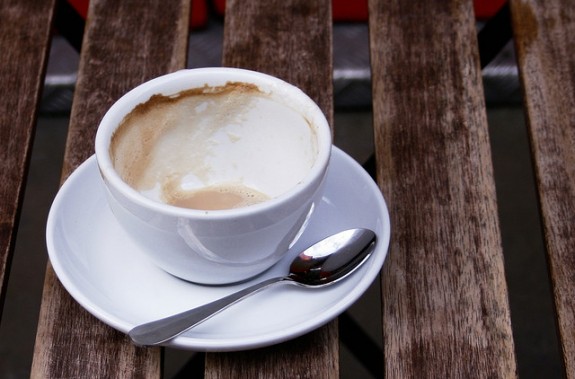Just for something a bit different, but interesting. I am in the throws of dissertation writing. I usually drink tea all morning, and water all afternoon/night. I just started drinking coffee this week again, BUT am cautious as my relationship with coffee sometimes does more harm than good - racing heartbeat, restless sleep, acid stomach. Lovely list of symptoms resulting from coffee abuse.
Over the years, I find that I crave two things when writing for intense long periods - fizzy water and sunflower seeds (instead of cigarettes I suppose). Maybe I was onto something...but while at OSU I was leaning on coffee big time.
A blog article from Smithsonian Magazine claims that coffee is actually not good for creative thinking, thus not good for successful working on my dissertation I'd say! Of course the article is followed by a link to a story about Elephant Poop coffee. How credible is this?
Read more: http://blogs.smithsonianmag.com/smartnews/2013/06/working-in-a-creative-field-despite-what-you-may-think-coffee-is-not-your-best-friend/#ixzz2WaNANGsj
Follow us: @SmithsonianMag on Twitter
Over the years, I find that I crave two things when writing for intense long periods - fizzy water and sunflower seeds (instead of cigarettes I suppose). Maybe I was onto something...but while at OSU I was leaning on coffee big time.
A blog article from Smithsonian Magazine claims that coffee is actually not good for creative thinking, thus not good for successful working on my dissertation I'd say! Of course the article is followed by a link to a story about Elephant Poop coffee. How credible is this?
Working In a Creative Field? Despite What You May Think, Coffee Is Not Your Best Friend
A coffee in hand as you pour over the news. A coffee in hand as you ride the subway to your co-working hub. A coffee to get the juices flowing while you brainstorm, sticking colorful Post-Its on the board. Ask nearly anyone in a creative profession the three things they can’t do without, and aside from a computer and smartphone, the top response is probably going to be coffee. But Maria Konnikova has some bad news for you, caffeine-loving creative professional: you’re doing it wrong.
Writing for the New Yorker, Konnikova surveyed the science of creative thinking:
Science is only beginning to unravel the full complexity behind different forms of creative accomplishment; creativity is notoriously difficult to study in a laboratory setting…Still, we do know that much of what we associate with creativity—whether writing a sonnet or a mathematical proof—has to do with the ability to link ideas, entities, and concepts in novel ways.
Challenging problems can be cracked in different ways—through hard work and a systematic slog, or through a flash of creative insight. But if you’re waiting for your eureka moment, says Konnikova, you may want to lay off the coffee.
Caffeine “boosts energy and decreases fatigue; enhances physical, cognitive, and motor performance; and aids short-term memory, problem solving, decision making, and concentration,” says Konnikova. But to string together seemingly unconnected ideas to spur a creative insight, you need your brain to relax. Creativity, says Konnikova, “depends in part on the very thing that caffeine seeks to prevent: a wandering, unfocussed mind.”
Coffee can still play a role in your work flow, helping you to really get down to business when you know what needs to be done and all that’s left is to crack it out. But when you’re relying on that next flash of insight, trade out the double espresso for something that lets you relax and gets your mind wandering.
More from Smithsonian.com:
Read more: http://blogs.smithsonianmag.com/smartnews/2013/06/working-in-a-creative-field-despite-what-you-may-think-coffee-is-not-your-best-friend/#ixzz2WaNANGsj
Follow us: @SmithsonianMag on Twitter

No comments:
Post a Comment